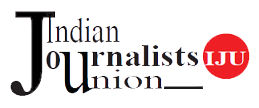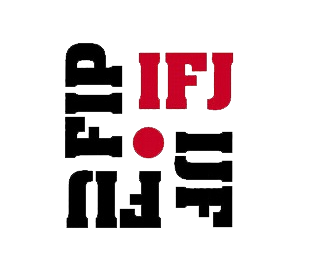Hundreds of journalists from Telangana staged a massive dharna in Parliament Street in New Delhi on 4 September to focus the attention of the nation and the journalists' community in the country on untimely death of 220 journalists in Telangana in the last four years, under the banner of Telangana State Union of Working Journalists (TUWJ). Undeterred by heavy rain, the journalists accompanied by their state and national leaders raised slogans demanding the intervention of the Union government to put an end to 'Tragedy of Journalism' in Telangana as the state government was unresponsive to demands of journalists to save them from misery and over work.
Journalists who travelled hundreds of kilometres from across Telangana demanded the state and central governments should take steps to implement Majithia Wage Board recommendations to all working journalists including rural journalists. They alleged that not even a single newspaper in the state was paying the rural journalists statutory wages. The situation in the electronic media, which is not covered under the Working Journalists Act, was worse. The state government, which has to enforce the implementation of the statutory wages to journalists, was looking the other way and was unconcerned over the plight of journalists, they said.
The CPI General Secretary S Sudhakar Reddy, National Secretary D Raja, CPM General Secretary Sitaram Yechuri, veteran journalist and Head, Centre for Media Studies (CMS) N Bhaskar Rao, Political Analyst Pentapati Pulla Rao, NUJ(I) leader Ras Bihari and several others addressed the journalists sitting on dharna and extended solidarity to their struggle.
Addressing the journalists, S Sudhakar Reddy called on Telangana government to take steps to save the lives of journalists in the state. He said "Do not think that you are doing something to journalists by way of charity, it is your social and democratic responsibility." He said his party would raise the matter in appropriate forums to solve their problems in particular and in the country in general. Senior MP D Raja also extended his solidarity.
Sitaram Yechuri said it was the duty of every concerned citizen to protect the press and journalists as they constituted fourth pillar of democracy. He expressed serious concern over the untimely death of 2018 journalists in Telangana in a short span of four years. "The tragedy was due to the negligence of state government to force media managements to implement the statutory wages to journalists and medical facilities to them. The state government should take immediate remedial measures to save the lives of journalists.”
IJU Secretary General Amar Devulapalli lamented that as the Telangana Chief Minister K Chandrasekhar Rao was not prepared to address the problems of journalists, the journalists had come all the way from far off districts of the state to Delhi to register their protest. "We tried to meet the Chief Minister to apprise him of the plight of the journalists and wanted to present him the survey report. He built a fortress and refused to come out to listen to our problems," he said.
TUWJ advisor K Sreenivas Reddy said the Telangana government was unconcerned over the plight of working journalists in the state. "It is sad the government is not moved even after the untimely death of so many journalists, "We should make the government open its eyes and take remedial steps to save journalists."
IJU President S N Sinha, Vice-President Sabina Inderjit also addressed the journalists. TUWJ President N Sekhar, General Secretary Virahath Ali, IJU Secretary Y Narender Reddy, NEC members K Satyanarayana and M A Majid, D Krishna Reddy and others led the dharna.
The IJU and TUWJ leaders released a booklet entitled 'Save Telangana Journalists' enumerating 220 journalists who died during the last four years between 2014 June and 2018 August due to work stress induced diseases, on the basis of survey conducted by the union. According to the survey the average age of the deceased journalists was 46 years. They left behind hapless families with young children and some of them had old parents.
The survey says "Having no financial means left behind by the sole breadwinner, the families of the journalists are languishing in misery." 75 journalists died of heart attack, 10 of brain haemorrhage, 20 of liver and kidney related diseases, 7 of cancer, 21 in road accidents, five-committed suicide and the rest died of other diseases. Rangareddy district is at the top of the chart with 34 deaths closely followed by Hyderabad city with 30 deaths. Mahbubnagar district came at the bottom of the chart with five deaths.
The death toll in other districts is Warangal 28, Medak 26, Karimnagar 22, Khammam 21, Nalgonda 20, Nizamabad 18, and Adilabad 14. The seriousness of the situation could be gauged from the fact that three journalists died of heart attack on the same day in July and one journalist committed suicide along with three members of his family-- his wife and two children a day after that incident. The TUWJ leaders said it was unprecedented not only in India but also world over that so many journalists died due to work-related diseases or accidents in a short span of four years in a single state. Six journalists, one of them with three family members, committed suicide due to financial misery because of non-payment of wages and work pressure.
Venkaiah promises action
Vice-President M Venkaiah Naidu promised to call Minister for Information and Broadcasting and discuss the problems and find a solution. About 40 journalists from Telangana met him at his official residence after dharna on Parliament Street and appraised him of the grave situation in Telangana where 218 journalists met untimely death due to over work and lack of wages. They presented him a copy of the survey report prepared by the TUWJ. The delegation was led by President Sinha, Vice-President Sabina Inderjit, Secretary General Amar, senior leader K Sreenivas Reddy, TUWJ President N Sekhar, General Secretary Virahath Ali and others.
Memorandum to Governor
Earlier the Union in a memorandum to the Telangana Governor E S L Narasimhan requested him to advise the State government to take urgent steps to improve the service and living conditions of the practitioners of journalism in the state of Telangana. Describing the condition of working journalists as 'pathetic', the memorandum said 2018 journalists died in the last four years due to over work and under wages. It said "The deterioration of the health of most journalists in the state is due to over work, tension and non-payment of wages by the newspapers and news channels for whom they are working. Another contributing factor is the half-hearted implementation the Journalists Health Scheme (JHS).
Analysing the situation in the state, the memorandum said "Most of the newspapers and news channels in the state do not pay the journalists, particularly those working in mofussil areas leaving them to fend for themselves. Not a single newspaper in the state is implementing the Majithia Wage Board recommendations in letter and spirit. The situation in electronic media is much worse.
The Union told the Governor that "Healthy democracy requires healthy journalists. It is important that the government should take steps to strictly implement the laws relating to working conditions and wages of journalists. Hence, we request you to kindly intervene and direct the government of Telangana to take urgent steps to implement statutory wages to all journalists working in print and electronic media and other laws related to their working and service conditions.
The government should implement the Journalists Health Scheme in its true spirit to save the journalists and direct the government to constitute the tripartite committee with all stake holders and to make it a functional body for the implementation of wage awards." The memorandum also requested the Governor to prevail upon the government to take urgent steps to implement statutory wages to all working journalists including those working in the rural areas and lift them from financial misery and work-induced ill health and save their lives. It also demanded the state government introduce pension scheme for retired journalists in recognition of their service to the society and democracy.




